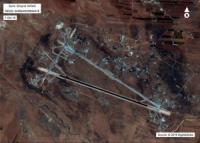-
U.S.-Morocco enduring friendship highlighted at Flintlock 2017
This year marked the tenth iteration of Exercise Flintlock, which focuses on building partner capacity and enhancing interoperability among twenty-four African and Western partners training in seven partner nations. The threat posed by violent extremist organizations around the world demands proficiency, coordination and enhanced interoperability in order to counter it. While regional security was the main focus of Exercise Flintlock 2017, “the lessons learned and investments in relationships will allow us to share the burdens of managing conflicts and improve our ability to provide security solutions that meet threats at their origin,” AFRICOM said.
-
-
Time to rethink the peace operations partnership in Africa
About 75 percent of all personnel in multilateral peace operations are now deployed on the African continent. Currently, the global partnership with African actors on peace operations is not sufficiently equitable and balanced. The underlying assumptions of the relationship between African and external actors need to be reconsidered, according to a new report, if peace operations are going to counteract current and future challenges to security (for example, terrorism, criminality and insurgency) and respond to the needs of local citizens and communities.
-
-
When ideas of peace meet politics of conflict
Burundi has experienced cycles of violence, civil war, and even genocide since achieving independence from Belgium in 1962. So, when this small central African country finally held democratic multiparty elections in 2005 following a lengthy peace process, the international community cheered. Here, perhaps, was a nation set to become a model for post-conflict inclusive governance. A model for building peace. Research by an expert in peacebuilding shows, however, how international ideas, practices, and language of conflict resolution are transformed when they meet African “realities and politics on the ground.”
-
-
The Bible as a weapon of war
Joseph Kony, the genocidal leader of the murderous Lord’s Resistance Army (LRA), claimed to have been sent by God to liberate the people of Northern Uganda. From the start of their insurgency in 1987, Kony’s LRA claimed as their major objective the establishment of a government based on the Ten Commandments. How do former Lord’s Resistance Army soldiers – men, women, and children who have used the Bible as a weapon of war – learn to reread the scriptures once they return home? This is the puzzle facing researchers from Uganda and Cambridge.
-
-
By insisting Assad must go, the West has prolonged the Syrian conflict

The most enthusiastic Western advocates of removing Assad form a liberal tendency and have been arguing for some form of intervention in Syria ever since the war began in earnest. They are opposed by more realist voices, who exhort them to remember the lessons of Iraq before getting militarily involved. Those on this side point to Syria’s fractured and often radical opposition, the regime’s formidable and battle-hardened forces, and the risks of starting a proxy conflict between the world’s great powers. In combination, these two tendencies have landed United States and United Kingdom foreign policy in an awkward gap between ends and means: Assad must go, but the military means required to remove him are off limits. It feels good to demand that a brutal dictator should no longer be allowed to rule, but insisting on it while failing to back it up with action has helped to prolong unimaginable suffering. Assad is clearly despicable, but the only atrocities worse than those his government has already committed are those yet to come. There are two ways to avert them: either Assad is deposed, probably via U.S.-led military intervention, or some political accord is struck to allow him to stay in exchange for a permanent ceasefire.
-
-
Islamist suspect arrested over Borussia Dortmund football club bus bombing

An Islamist suspect has been arrested by the German police, and a second one is being sought, over three explosions which yesterday rocked the team bus of Borussia Dortmund football club. The bus was hit while on its way to the Signal Iduna Park stadium for a European Championship League quarter-final game against the Monaco football club. The game is being played today, under heavy security.
-
-
Why do some with radical views become terrorists – but others do not?

Since most people who hold radical views do not become terrorists, what are the factors that drive some to violent extremism? Is there a connection between mental illness and terrorist involvement? And why do some interrogators resort to torture when the body of evidence shows building rapport with suspects is more effective? These questions and others are addressed in a special issue of American Psychologist, the flagship journal of the American Psychological Association.
-
-
New training course on understanding, preventing radicalization, violent extremism
Practitioners and civic actors including law enforcement officers, school officials and community leaders can now, through a new self-paced, online training, gain a better understanding of radicalization to violence and violent extremism in the United States. Made available at no cost to learners, thanks to funding from the DHS, the course will also introduce a broad spectrum of community-led activities intended to foster resilience and counter violent extremism.
-
-
The Assad regime’s chemical-weapons kill chain

“There’s a long list of Syrian officials with blood on their hands — but the culpability goes all the way to the top,” Gregory Koblentz writes in one of the more important analyses of the Assad regime’s strategic use of chemical weapons (“Syria’s Chemical Weapons Kill Chain,” Foreign Policy, 7 April 2017). Koblentz, the author of Living Weapons: Biological Warfare and International Security, explains that the Syrian chain of command for chemical weapons is composed of four tiers: the senior leadership, which authorizes the use of these weapons and provides strategic guidance; the chemists, who produce, transport, and prepare the chemical weapons for use; the coordinators, who provide intelligence on targets and integrate chemical weapons with conventional military operations; and the triggermen, who deliver the weapons to their targets. “Together, these individuals and organizations form a chemical-weapons kill chain,” Koblentz writes.
-
-
Why can’t America just take out Assad?

As costly as Western inaction in Syria has been in the six years since the Arab Spring uprisings first took hold in Syria, recent history suggests that removing Assad in a hurry would be an even bigger mistake. Unlike in a game of chess, in war removing the king is not the end, but only another beginning. Targeting Assad would likely give birth to the same kind of catastrophe we saw in Libya after Muammar Gaddafi’s fall. In Libya, with no true civil governance to hold the structure together, tribal alliances collapsed and a four-way fight for power emerged. Assad shouldn’t remain in power – he’s been proving that for six years. The recent Sarin gas attack is only the most recent on a long list of other human rights violations. But he should be part of a political and legal process that removes him. That process must come from the Syrians themselves, not from the outside.
-
-
Bolstering security in urban centers
The terrorist attack in Stockholm on Friday mimicked previous attacks in Europe, in which terrorists used vehicles to kill civilians. Among the cities in which such attacks were carried out are London, Nice, Glasgow, Berlin, and more. More and more cities are considering the use of bollards to protect not only buildings – but other, “softer” urban areas. The Whole Building Design Guide (WBDG) program of the National Institute of Building Sciences offers a detailed Resource Page with useful analysis of and information about crash- and attack-resistant bollards.
-
-
Driver privacy can be compromised in Usage-Based Insurance (UBI) systems
Researchers have demonstrated that it is possible to compromise a driver’s private information stored in the cloud for Usage-Based Insurance (UBI) programs, based on only part of the data collected. UBI programs determine a consumer or fleet insurance premium rate based on several driving parameters that are collected, including total driving time, cornering and average speed. As part of the burgeoning Internet of Things (IoT) connected-device functionality in vehicles, driver data is gradually being stored in the cloud, rather than onboard a vehicle’s computer.
-
-
U.S. strikes Syrian airbase from which Assad forces launched sarin gas attack

The United States has launched fifty-nine Tomahawk cruise missiles on a Syrian airfield from which Syrian military planes three days ago flew to carry out a sarin gas attack against Sunni civilians in the rebel-held Idlib province. More than eighty people, including thirteen children, were killed in the attack – and in a subsequent attack by the Syrian Air Force which destroyed the hospital to which many of the victims of the gas attack were taken. The cruise missiles were launched from the guided-missile destroyers USS Ross and Porter in the eastern Mediterranean. The United States has had military advisers and specialist on the ground in Syria for a while – it now has about 1,000 soldiers in Syria — advising the anti-regime rebels – especially the Syrian Kurds – but last night cruise missile attack marks the first time the United States has been involved as a combatant in the Syrian conflict.
-
-
Will the U.S. missile strike be the turning point in Syria’s shifting war?

The United States has struck the Syrian airbase used to launch a suspected sarin gas attack against Khan Sheikhun that killed more than eighty civilians. The rebel commander whose district was hit by the suspected chemical weapon attack has said he hopes the strike will be a “turning point” in the war — but the long-running conflict has had many such apparently pivotal moments. A shift of U.S. foreign policy on Syria could have been the game-changer. But the U.S. airstrike is more likely to reinforce the balance of power between the combating factions rather than lead to a turning point.
-
-
New technology helps protect biometric databases
More and more people are leaving their fingerprints behind – in passports, when logging in to online banking or their mobile phones. Have you thought about where your fingerprint information is stored and who has access to it? Whether we store fingerprints on our mobile phone chip, with our server host or in the cloud, security is always a concern. Scientists are constantly searching for new and better security solutions to protect your information.
-
More headlines
The long view
Preventing Another 'Jan. 6' Starts by Changing How Elections Are Certified, Experts Say
The 2024 presidential election may be a rematch between President Joe Biden and former President Donald Trump, but preventing a repeat of Jan. 6, 2021 — when false claims of a stolen election promoted by Donald Trump and his allies led to an insurrection at the U.S. Capitol —will be top of mind this election year. Research finds broad support among public for nonpartisan certification commissions.
States Rush to Combat AI Threat to Elections
This year’s presidential election will be the first since generative AI became widely available. That’s raising fears that millions of voters could be deceived by a barrage of political deepfakes. Congress has done little to address the issue, but states are moving aggressively to respond — though questions remain about how effective any new measures to combat AI-created disinformation will be.
Chinese Government Hackers Targeted Critics of China, U.S. Businesses and Politicians
An indictment was unsealed Monday charging seven nationals of the People’s Republic of China (PRC) with conspiracy to commit computer intrusions and conspiracy to commit wire fraud for their involvement in a PRC-based hacking group that spent approximately 14 years targeting U.S. and foreign critics, businesses, and political officials in furtherance of the PRC’s economic espionage and foreign intelligence objectives.
European Arms Imports Nearly Double, U.S. and French Exports Rise, and Russian Exports Fall Sharply
States in Europe almost doubled their imports of major arms (+94 per cent) between 2014–18 and 2019–23. The United States increased its arms exports by 17 per cent between 2014–18 and 2019–23, while Russia’s arms exports halved. Russia was for the first time the third largest arms exporter, falling just behind France.
LNG Exports Have Had No Impact on Domestic Energy Costs: Analysis
U.S. liquified natural gas (LNG) exports have not had any sustained and significant direct impact on U.S. natural gas prices and have, in fact, spurred production and productivity gains, which contribute to downward pressure on domestic prices.
